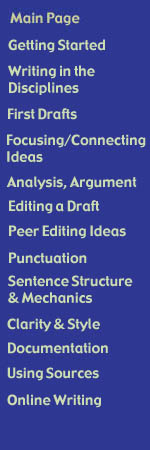

Reasoning:
General Inferential Errors
By David Roberts
(printable version here)
The process of inference – reasoning to conclusions based upon evidence – is an essential element in academic writing. Unfortunately, writers often err in the inferences they make. In addition to more specific inferential errors (see our pages on errors in causation, errors in generalization, and other logical fallacies), writers often make one or more of four general errors when attempting to infer conclusions. These errors are all similar in that they reason to conclusions that are too strong. In other words, based upon the given evidence, the conclusion they draw could still be wrong.
Affirming the Consequent
Affirming the consequent occurs when writers are discussing “if-then” relationships and infer too much from the knowledge they have available to them.
An if-then relationship involves two parts: the “antecedent” and the “consequent.” In:
“If it is raining, the ground is wet,”
the “if” part of the sentence is the antecedent and the “then” part is the consequent.
When writers affirm the consequent, they take the truth of the “then” part to infer something about the "if" part:
"The ground is wet. Therefore, it is raining."
The problem, of course, is that something else could make the ground wet. The sprinkler system could be on, or someone may have forgotten to turn off the garden hose. Based upon only the fact that the ground is wet, we do not know that it is raining.
Denying the Antecedent
A related error occurs when one infers that, because the “if” part of the sentence is false, the “then” part must also be false.
Again using the example of rain and wet ground, one would commit this error by concluding that:
"Because it is not raining, the ground is not wet."
These words alone do not guarantee that the ground is dry. This statement indicates an error in reasoning for the same reason that affirming the consequent is fallacious: there may be other reasons for the ground to be wet. If the sprinkler system is on, the ground is wet even though it is not raining.
Appealing to Ignorance
This error also involves inferring too much from the known facts. Appealing to ignorance means that one concludes a statement must be false because it has not been proven true, or vice versa.
Consider the example of North Korean nuclear weapons. One person might say,
“North Korea does not have nuclear weapons: no one has proved that they exist!”
Another could counter,
“But of course North Korea has nuclear weapons: no one has proved that they don’t!”
In both of these cases, there is insufficient evidence to draw such a sweeping conclusion. In either example, it is possible for North Korea to have nuclear weapons. Writers could then articulate reasons why it is more likely or not that North Korea does, in fact, have nuclear weapons.
Hasty Generalization
Making predictions and generalizations is essential in academic writing. Still, writers can all too easily mistakenly generalize based upon insufficient evidence.
As the name suggests, a hasty generalization occurs when a conclusion is drawn too quickly; that is, before all relevant information is considered. For example, a student might say,
“I did well on that test and didn’t even open the book! I don’t need to study for the next test in this class!”
This conclusion is drawn too quickly; the material on the second test may be more difficult. The point is that one cannot look at a single, potentially isolated event and attempt to infer too much information from it. Often, hasty generalizations arise from not considering pertinent information or using unrepresentative example.
Back to 'Analysis and Argument'
Writer's Web | Writing Center | Make
an Appointment | Library
Copyright Info